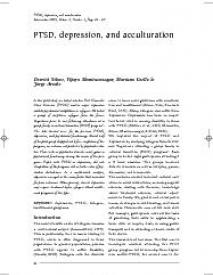PTSD, depression, and acculturation
In this pilot study we tested whether Post Traumatic Stress Disorder (PTSD) and/or major depression inhibits psychosocial adaptation in refugees. We tested a group of sixty-three refugees from the former Yugoslavia prior to and following attendance at a group family in cultural transition (FICT) program1. The tests studied were for the presence PTSD, depression, and psychosocial functioning. Almost half of the pilot group dropped out before completion of the program, an outcome not predicted by psychiatric status. Those with no psychiatric disorder made gains in psychosocial functioning during the course of the program. People with PTSD or depression, did not. Completion of the program did not alter rates of psychiatric disturbance. In a multivariate analysis, depression emerged as the main factor that accounted for poor outcomes. When present, clinical depression may require treatment before refugees attend resettlement programs of this type.
Geachte bezoeker,
De informatie die u nu opvraagt, kan door psychotraumanet niet aan u worden getoond. Dit kan verschillende redenen hebben,
waarvan (bescherming van het) auteursrecht de meeste voorkomende is. Wanneer het mogelijk is om u door te verwijzen naar de bron
van deze informatie, dan ziet u hier onder een link naar die plek.
Als er geen link staat, kunt u contact opnemen met de bibliotheek,
die u verder op weg kan helpen.
Met vriendelijke groet,
Het psychotraumanet-team.
Reference:
Derrick Silove, Vijaya Manicavasagar, Mariano Coello & Jorge Aroche | 2005
In: Intervention: the international journal of mental health, psychosocial work and counselling in areas of armed conflict, ISSN 1571-8883 | 3 | 1 | 46-50
http://www.interventionjournal.com/sites/default/files/46_50%20Silove.pdf
In: Intervention: the international journal of mental health, psychosocial work and counselling in areas of armed conflict, ISSN 1571-8883 | 3 | 1 | 46-50
http://www.interventionjournal.com/sites/default/files/46_50%20Silove.pdf


